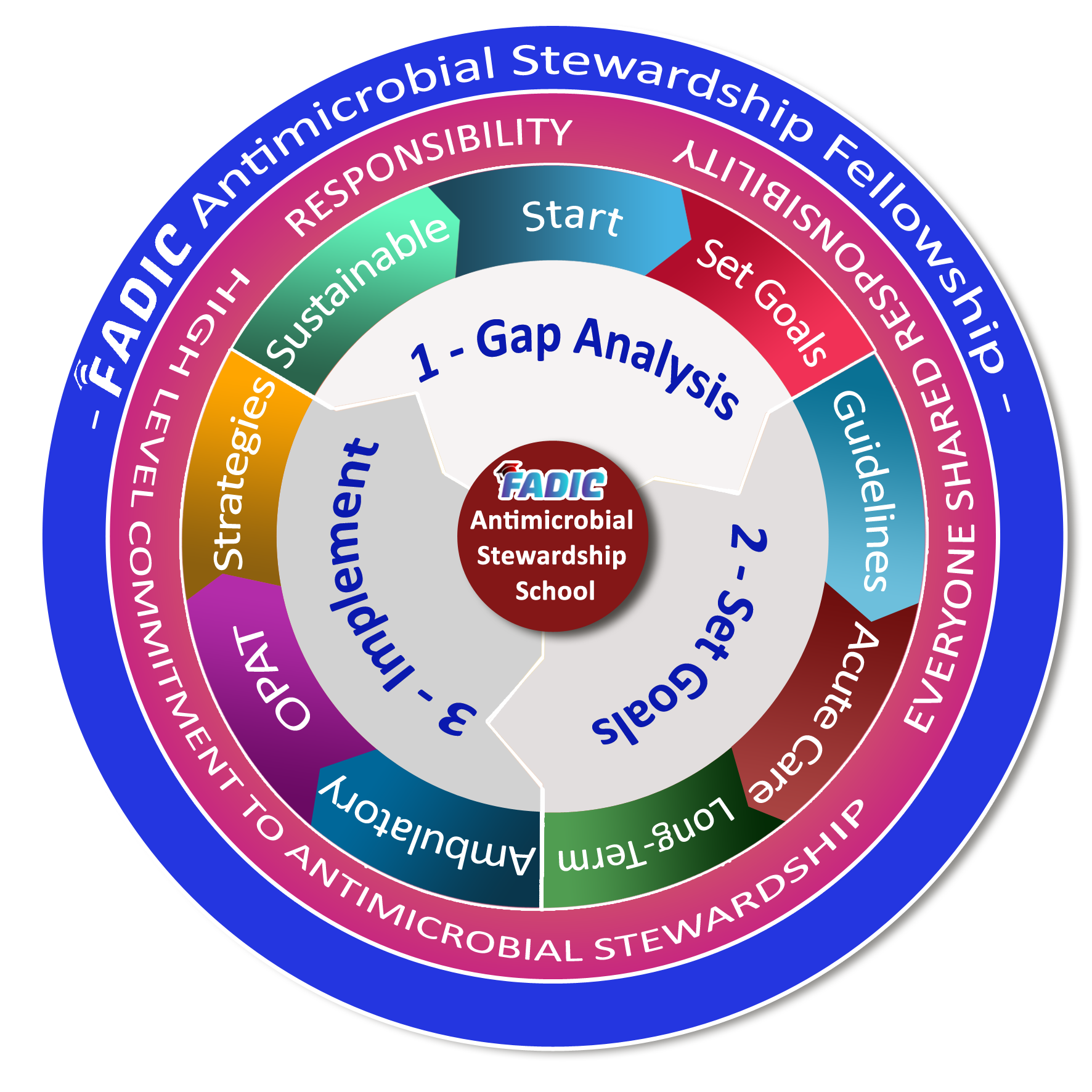Antimicrobial Stewardship Fellowship Program
Antimicrobial Stewardship School
Antimicrobial Stewardship Resistance (AMR)
- Antimicrobial resistance is a global crisis that requires urgent attention and action.
- The misuse of antibiotics has also contributed to the emergence of multi-drug resistant organisms (MDROs) that are difficult to treat, causing substantial morbidity and mortality.
- The Story Beginning >> In 1940, Sir Alexander Fleming “After Discovery of the Penicillin”, realised that antimicrobial resistance (AMR).
- AMR can happen when giving an insufficient dose of the antibiotics to the patient, you will not kill the bacteria, but you will educate them on how to be resistant.
- End of Story >> In 2016 after the UK report for the expected 2050 mortality rate, that expects the AMR mortality rate will be 10 million cases per year. Which will be more than cancer mortality, and other diseases.
- Antimicrobial Stewardship has been started at 2014, to raise the awareness and education of AMS among Healthcare Professionals (HCPs).
Antimicrobial Stewardship (AMS)
- Antimicrobial stewardship (AMS) is a set of actions promote the effective use of the antimicrobials.
- The Antimicrobial stewardship is defined as an organisational or hospital-wide approach to promoting and monitoring judicious use of antimicrobials to preserve their future effectiveness
AMS Strategies and Measures
- According to the literature, there are many antimicrobial stewardship tools, interventions and activities (collectively termed “strategies”) that can be used to improve antimicrobial use and educate prescribers.
- These Strategies and interventions aimed at improving appropriate prescription of antibiotics
- To improve antimicrobial use, it must be measured.
- By Identifying the measurable elements/metrics that can used to evaluate the outcomes of AMS .
COVID-19 and AMR
- The COVID-19 is a global pandemic took much of the world surprise.
- COVID-19 is accelerating the AMR and economic burden.
- ICU admission and mechanical ventilation significantly increases the risk of patients acquiring secondary bacterial infections.
- The COVID-19 pandemics accelerate the threat of AMR and increased ‘just in case’ antimicrobials prescribing, the WHO argues apply AMS.
- Need emergency preparedness for future crisis!
Antimicrobial Stewardship School introduce the AMS Fellowship
FADIC fellowship program provides dedicated training in antimicrobial stewardship and its implementation in well organised discipline
1- Pharmacology, Pharmacokinetics, Pharmacodynamics and Microbiology Pharmacotherapy (2 months)
- The fellowship curriculum includes two weeks of formal antimicrobial stewardship introduction and training. During this block, fellows prepare a Simulation Scenario presentation.
- Then the fellows will present this scenario cases including the systematic thinking approach in applying the antimicrobial stewardship program through the patient care level. This systematic approach includes (Pharmacology, Pharmacokinetics, Pharmacodynamics and Microbiology Pharmacotherapy with regards to the disease guidelines).
2- The antimicrobial stewardship empirical treatment guidelines and surgical prophylaxis (2 Months)
- Here the fellows will learn all about the antimicrobial stewardship empirical treatment guidelines, with regards to the surgical prophylaxis and surgical site infections.
- It will include the respiratory tract infection (Upper and Lower respiratory tract infections), Urinary tract infections, Skin and soft tissue infections, CDI infection and others)
- Additionally in Sepsis, Clostridioides Difficile Infection (CDI) and Acute Bacterial Skin and Skin Structure Infection (ABSSSIs)
- How to select the right antibiotic therapy with regards to the patient clinical condition.
3- The Anti-fungal stewardship (1 Month)
- In this module, the fellows will learn all about antifungals, pharmacology, pharmacokinetics and pharmacodynamics and how to apply anti fungal stewardship.
- Additionally, discuss how to apply it in the Candida Infections and other types.
4- Appropriate Measures and Metrics for Antimicrobial Stewardship in acute care settings (2 Months)
- The primary focus of this module is to train the fellows to run the multidisciplinary rounds, and the prospective audit with feedback.
- Additionally, learn how to built up a stewardship team, the team reviews the charts of all hospitalised patients who have been receiving antibiotics for more than 48 hours and, as appropriate.
- Moreover, offers guidance for antimicrobial therapy.
- Recommendations arising from stewardship rounds are conveyed to the clinical teams using an in-person “handshake stewardship” strategy, which facilitates in-depth discussions of individual cases and enables education of prescribing physicians and other providers.
- Specific training in hospital epidemiology, antibiogram, and infection prevention are provided including:
- Strategies for Stewardship Intervention
- Stewardship Outcome in Acute Care Settings
- Antimicrobial Stewardship Committee
- Infection Control & Antibiogram
- Antimicrobial Stewardship Policy/ Guidelines/ Proposal
5- Antimicrobial Stewardship in Long-Term Care (LTC) (1 Month)
- Pharmacokinetics/ Pharmacodynamics for Physician
- Approach to Infection in Older Adult
- Guide to Manage LTC Common Infections
- Stewardship Intervention & Outcomes in Long-Term Care (LTC)
- Nursing’s Role in Antibiotic Stewardship
6- Antibiotic Stewardship in Ambulatory Care (1 Month)
- Guide to Antibiotic Stewardship in Ambulatory Settings
- Community Stewardship Business Plan
- Road Map for Ambulatory ASP
- Patients as a Guardians of Antimicrobial Stewardship
7- Out-Patient Parenteral Antimicrobial Therapy (OPAT) (1 Month)
- Clinical Efficacy and Cost-Effectiveness of OPAT
- Comparison of OPAT Techniques/ Outcomes
- OPAT Good Practice Recommendations
- Write a Relevant OPAT Policy
- OPAT Outcome Assessment
8- Antibiotic Stewardship Action Plan and Research Scholarship (2 Months)
- In this module, the fellows will learn how to understand the data, and clinical research.
- Additionally, provide our fellows with unparalleled opportunities for antimicrobial stewardship research and publication, with regards to the AMR action plan. It will also provide the followings:
- Action Plan for Antimicrobial Stewardship
- Strategic & Sustainability Plan for Antimicrobial Stewardship
- Essential Resources & Strategies for Antimicrobial Stewardship
- Antimicrobial stewardship research methodology and publication
Educational Objectives
By the end of this antimicrobial stewardship fellowship series, fellows will able to:
- Describe the roles and responsibilities of antimicrobial stewardship team members.
- Identify the evidence-based antimicrobial stewardship interventions used to improve antibiotic prescribing pertinent to a structured scenario.
- Design a multidisciplinary solution to a structured antimicrobial stewardship scenario.
- Apply antimicrobial stewardship metrics and quality improvements
- Analyse the antibiotic stewardship results and prepare the action plan
- Publish antimicrobial stewardship papers and presentations
About the Fellowship Program
- Firstly, FADIC offers a dynamic 1-year research fellowship program in drug information with an emphasis in evidence-based practice.
- Additionally, the program offers an intensive, rewarding experience in drug information-related research.
- Moreover develop the clinical practice that will develop your skills and expertise.
- It is suitable for a career path in academia, industry, or clinical practice.
- Finally, the program provides an intensive experience in drug information related research, practice, teaching and learnings.

As FADIC was pledged to sign up with CDC to tackle the antimicrobial resistance (AMR) challenge.
It is time NOW for everyone in healthcare system to learn how to apply antimicrobial stewardship in an effective way.
NOW, Are You Ready to Be an Antibiotic Steward?
Said: Dr Rasha Abdelsalam
Director of Antimicrobial Stewardship School
This Antimicrobial Stewardship Fellowship is For
| What You Will Get Every Week (Lesson Planning) | |||
| Online Lesson | Workshop / Project | Mentor Support | Reviewer |
| (2-3 Hours) per week
(English Slides & Arabic Speaking) |
(60 Minutes) per week | Every week |
Review the answers with feedback
|

- In 2019, the Antimicrobial Stewardship School is launched in as per FADIC commitment toward antimicrobial stewardship program certification.
- Target of this school will be: Physician, Practitioners, Pharmacists, Nurses, and all interested in applying antimicrobial stewardship in their work place.
- It aims to teach you all about stewardship from setting a reliable goals for stewardship into your workplace.
- Additionally, how to apply antimicrobial stewardship program between different hospital settings.
- You will learn how to put strategies for its intervention, metrics, and outcome. Finally, you will learn how to measure the outcome of stewardship and put a valid dashboard to measure your work practice.
- You will learn how to apply antimicrobial stewardship in different infectious disease clinical conditions.
- Importantly, learn how to apply it in Acute Care setting, Ambulatory Care Settings, Long-term care settings, and in Outpatient Parenteral Antimicrobial Therapy (OPAT).
A very interesting thing that you will learn in this AMS fellowship:
Firstly, how to create a sustainability plan for antimicrobial stewardship program into your organisation.
- Secondly, how to make your program in your workplace an international program with other organisations worldwide.
- Then, how to share your results internationally.
- It is now time to be part of change, not it is an urgency to change your practice in antimicrobials, and be an antibiotic stewards.
Purpose of this Fellowship
- The purpose of this fellowship Program is to prepare you to practice as an antimicrobial stewardship champion
- Moreover, practice excellence achieved by:
- Demonstrating accountability for focused project work
- Modeling excellence in drug information practice
- Participating in research and performance improvement projects focused on clinical care and improving the antibiotic use process
- Demonstrating the ability to collaborate with healthcare professionals to communicate key information and guide decision making
- Facilitating, leading, and actively participating in antimicrobial stewardship discussions and committees important to the role of a hospital long term care practice.
AMS Fellowship Learning Outcomes
Required Outcomes
- Firstly, serve as an authoritative resource on the formulary management process
- Moreover, guide the development of recommendations that serve to optimise a health system formulary
- Provide evidence-based, patient-centred medication therapy recommendations during antimicrobial stewardship consults
- Additionally, make recommendations to optimise the use of medications by participating in the medication use evaluation.
- Make recommendations to optimise antimicrobial stewardship content in promotional materials and content writing.
- Participate in activities that drive development of action plans during antibiotic management
- Moreover, participate in the development of medication policy, guidelines and strategic plan
- Demonstrate excellence in the provision of training or educational activities for health care professionals and health care professionals in training, interprofessional training.
- Actively participate in the analysis of antibiotic report and prepare antibiotic action plan and AMR report.
- Complete required rotations, word rounds and clinical work
- Conduct antimicrobial stewardship and/or pharmacy practice research
- Function effectively in hospital, ambulatory, and long-term care.
Elective Outcomes
- Publish on topics related to the antibiotic or antimicrobial stewardship
Application Process
- The Drug Information fellowship Application Process.
- Additionally, the application should include a letter of interest, curriculum vitae, and one letters of recommendation.
- Moreover, the application materials for FADIC in the Drug Information Fellowship must be sent electronically.
- Applications should be sent to the following e-mail address: Info@FADIC.net
Lecturer
BCPS – AQ (ID), CPHQ, TQM (AUC), Dr. Rasha is a CEO of FADIC. She was in Tanta university hospital, Egypt. In 2013, she received TQM from American university, BCPS, CPHQ, and M.Sc. of Clinical Pharmacy. She received certification from SIDP. She obtained the add qualification from American board in infectious disease. Leaded MM CBAHI Saudi accreditation. Established stewardship committee, and implementation in MCH, Makkah, Saudi Arabia. She shared in item exam writing for BCIDP Exam. She shared as a reviewer in infectious diseases PSAP. Authorship for published around 20 papers. One paper about vision of 2030 of general pharmaceutical department in Saudi Arabia. She received TLC certification from ACCP academy. Moreover, consultant on personal, professional, stewardship leadership, research. Share in strategic planning; hospital accreditation; and stewardship education.Dr. Rasha Abdelsalam

Master & Diploma of clinical pharmacy.
Quantitative Research Certification.
Antimicrobial Stewardship Certification/SIDP.
Item Writing American Board of Infectious Disease.
Reviewer for PSAP ID 2018 Series
In FADIC Stewardship Fellowship you will have
Learn with FADIC Mentorship Reviewer System
You will have your own mentor, who will facilitate the learning journey in the antimicrobial stewardship & answer all your questions, additionally the reviewer who will review all your projects & workshop.
Download Handouts of the course from FADIC & print it
You will be able to study and print all the handouts

Access and Updates
The access for the AMS fellowship will continue through 24 months from the initial registration time, including all updates, handouts and videos.

Download Pocket Guide for Antibiotic Pharmacotherapy Book for Free from FADIC

حمل الآن كتاب لا تساوم, البكتريا تقاوم مجاناً من فادك عند اشتراكك في البرنامج مع فادك
Related Courses
- Antimicrobial Stewardship Fellowship Program
- Antimicrobial Stewardship Program in Acute Care Setting
- Patient Education and Counseling Program
- ABC of Bacteria Course
Related Mini Courses /One-day Workshop:
- Goals of Antimicrobial Stewardship
- Respiratory Tract Infection: How to Apply Antimicrobial Stewardship?
- Practical Guide for Antimicrobial Stewardship Committee
- Antimicrobials Pharmacokinetic & Pharmacodynamic
- Clostridioides Difficile Infection (CDI) Prevention Program
- Acute Bacterial Skin and Skin Structure Infections
- Sepsis Training Program
- Antifungal Stewardship: Implementation Guide
- Antibiogram Best Use & Interpretation
- Urinalysis Tract Infection: Role of Antimicrobial Stewardship
- Surgical Prophylaxis Antimicrobial Stewardship
Related Books:
- Pocket Guide for Antibiotic Pharmacotherapy
- Antibiotic Cards
- FADIC Outpatient Parenteral Antimicrobial Therapy (OPAT)
- كتيب فادك للتوعية بمخاطر سوء الاستخدام للمضادات الحيوية
Keep Learning From FADIC Blog:
- Candidate Success Story – FADIC Antimicrobial Stewardship Program
- Antimicrobial Stewardship in Surgical Prophylaxis
- Hospital Antibiogram Role in Antimicrobial Stewardship
- Antimicrobial Stewardship Strategies
- Colistin Between Nebulizer and Intravenous Forms
- إرشادات المضادات الحيوية – لا تساوم البكتيريا تقاوم
- المضادات الحيوية الأكثر شيوعاً واستخداما في الوصفات الطبية
- المضادات الحيوية
FADIC Antimicrobial Stewardship School
Stewardship Education provides certification for stewardship in Acute, Long-term care, Ambulatory, and Community settings
Read MoreStewardship Blog provides Resources, Stewardship Library, and updated in infectious diseases
Read MoreStewardship Services provides Toolkits, Proposal, Strategic Plan, and Consultation enable you to apply ASP into your work
Read More
 Log in
Log in Sign up
Sign up



